 |
| A drifter (Kevin Costner) inspires hope by delivering mail after the apocalypse. |
Release Date: Dec. 25, 1997. Running Time: 177 minutes. Screenplay: Eric Roth, Brian Helgeland. Based on the novel by: David Brin. Producer: Jim Wilson, Steve Tisch, Kevin Costner. Director: Kevin Costner.
THE PLOT:
At the turn of the 21st century, the apocalypse was triggered not by some international incident, but instead by an idiot. Nathan Holn preached for white supremacy and against democracy, and he managed to inspire a large enough following to tear down the United States of America, apparently in part by setting off nuclear devastation.
More than a decade later, in the near future year of 2013, a drifter (Kevin Costner) travels through the sparsely populated wasteland that was the American west. When he stops at the wrong town at the wrong time, he ends up pressed into the army of the "Holnists," followers of Nathan Holn's teachings led by Gen. Bethlehem (Will Patton), who has set himself up as a feudal ruler.
The drifter manages to escape. He finds the wreckage of a postal truck, with the uniformed skeleton of the postal carrier along with undelivered mail from just before the apocalypse. He takes on the role of "postman" so that he can get a meal and shelter at a nearby town. But when he spins his tale of being a postal carrier for the newly restored United States, he becomes an unlikely symbol of hope for the harried survivors.
And hope is one thing that Gen. Bethlehem isn't about to tolerate...
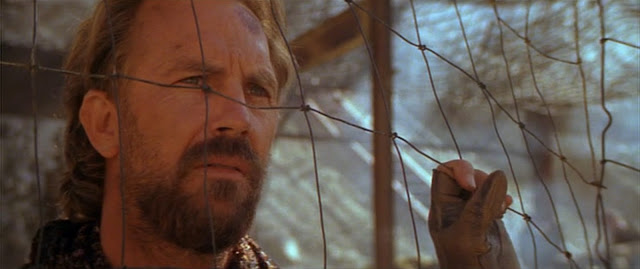 |
| A prisoner of the Holnists. |
KEVIN COSTNER AS THE POSTMAN:
One thing I will say for director Kevin Costner: In all three of his films, he's shown an awareness of the strengths and limitations of star Kevin Costner. He seems to recognize that he's not the best at emoting. Gen. Bethlehem makes grandiose speeches, and members of the supporting cast get emotional moments. Meanwhile, Costner mostly just reacts to events as they occur.
This is actually a good approach to the character. The "Refusing the Call" stage of The Hero's Journey? For The Postman, that's most of the movie. He adopted this persona as a con to get a meal. He indulges young Ford Lincoln Mercury (Larenz Tate) when he asks to be sworn in as a postal carrier - but he's instantly appalled when Ford declares that he would die to get a letter to its destination.
He tries at one point to disband the fledgling postal service, because he neither wants to get killed or watch his young followers die. Try though he might, however, he cannot put that genie back into the bottle. Even when he accepts this and rides to his climactic confrontation with Gen. Bethlehem, he dismisses both himself and Bethlehem as just "a couple of phonies."
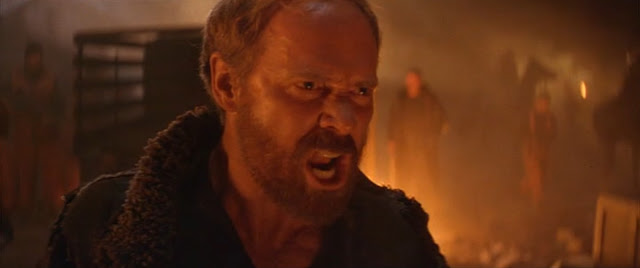 |
| Gen. Bethlehem (Will Patton) will not tolerate dissent. |
OTHER CHARACTERS:
Gen. Bethlehem: The ever-reliable Will Patton leans into the post-apocalyptic silliness, chewing scenery with abandon as the villain of the piece. Bethlehem was a small man, a copy machine salesman who was granted purpose by the end of civilization. He now leads an army, but at heart he remains small. He's sadistic when backed by an army, but he tries to deny a one-on-one challenge when it comes. He's also literally impotent, as the movie spells out because subtlety is for losers. Still, he's well read and able to speak with passion, which is enough for him to attract followers who are hungry to live a life that matters. And yes, that very same hunger for meaning and connection is what turns the communities away from him and to the postman. The very element of human nature that he exploits is the one that undermines his control.
Ford Lincoln Mercury: Dumb question: Why is Ford (Larenz Tate) a supporting character? He's the one who, after meeting the Postman, does the actual work of setting up a functioning regional postal service. All of which happens offscreen. Ford is the real driving force of the story, with Costner's Postman only agreeing to head the new service because he can't make himself disappoint the eager recruits. Wouldn't it have been more meaningful if we followed Ford as the viewpoint character, seeing the Postman only through his eyes? Learning that the Postman's claims are lies with Ford, and then deciding - with Ford - that what they've built matters in spite of that? This film has several missed opportunities, and restricting Ford to a supporting role is one of the biggest.
Abby: The young Olivia Williams is stunningly gorgeous. Yes, I'm leading with that. Why not? The film does. She's introduced asking The Postman to have sex with her because her husband (Charles Esten) is sterile, and her early scenes mainly focus on how pretty she is. Williams, a fine actress, gets some good scenes later: reacting with anger and hatred to Bethlehem, for instance, or when she becomes bitterly disillusioned by the Postman. But the last part of the film completely reduces her to eye candy. Well, eye candy plus Costner cheerleader.
Sheriff Briscoe: Daniel von Bargen is very good as the crusty sheriff of Pineview, the town where The Postman first makes his claims. The townspeople believe in The Postman because they so desperately want to. And because The Postman does have a letter for a blind town resident that makes her and others happy, the sheriff allows them to believe. But he smells what the bull dropped, and he makes clear that he wants this stranger gone before he causes trouble. Even so, he can't fully dismiss his own hope. He knows that this stranger is lying... but he still gives him a letter to his sister before sending him on his way.
Col. Getty: Television mainstay Joe Santos makes a strong impression as Bethlehem's right-hand man. Getty was the last person to challenge Bethlehem for leadership, in a fight we're told lasted mere seconds. Getty was rendered mute, but he has remained loyal to Bethlehem. Santos is able to say much with a few looks. He pauses to show compassion for Luke (Scott Bairstow), stopping another Holnist from shooting Luke when he defects to the Postman. Also, while he cannot speak, he ends up with the final word on the story's conflict.
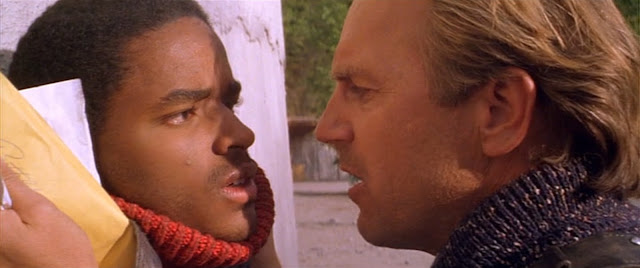 |
| "How much mail can a dead postman deliver?" The Postman and Ford (Larenz Tate) differ about the value of the mail. |
"SAY SOMETHING NICE":
OK... Exactly how could this be considered the Worst Picture of 1997 or any other year? I'm not going to call The Postman a good movie, because it's not. There are some pretty big problems with both structure and pacing.
That said, I wouldn't call this a particularly bad movie either. It looks terrific, its $80 million budget absolutely visible on screen. It's generally well acted; as I mentioned, Costner seems to be aware of his own limited range and keeps well within that, trusting the heavy emotional moments to the strong supporting cast. A few emotional moments even somehow manage to land - notably a wordless scene in which Sheriff Briscoe finally gets a reply to his letter.
There's plenty wrong here, and I'll spend most of the rest of this review talking about that. But the movie only truly faceplants in its final stretch. Until the last thirty minutes or so, it at least kept me generally entertained.
I'm not going to rank myself among this movie's defenders... but unlike, say, Howard the Duck, I have no difficulty seeing why this film has defenders. There's a very good movie in here somewhere - and every so often, you're able to catch a decent glimpse of what it might have been.
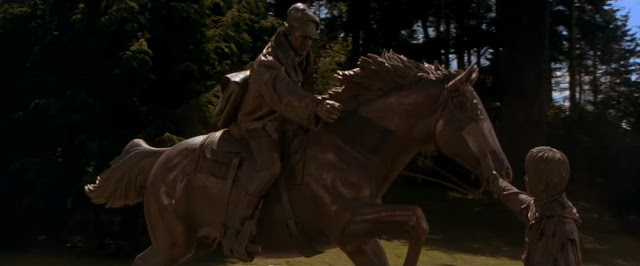 |
| The Postman gets a statue. Because of course he does. |
VANITY, THY NAME IS KEVIN:
The million dollar question: Does The Postman qualify as a vanity project? On the one hand, Costner had a previous track record as the director of the Oscar winning hit, Dances with Wolves. He also distributes strong moments to other members of the cast in a story that sees him spending half the running time trying to stay alive and/or con people into giving him food and shelter so that he can stay alive.
On the other hand. Well...
Never mind that he stars, produces, and directs. If that's all it took to make a vanity project, then you could apply the same label to more than half of Clint Eastwood's output. I'd even allow for him casting his daughter in a supporting role. Annie Costner, as the similarly nameless "Ponytail," acquits herself passably. She's a little wooden, but I've seen worse from properly trained actors.
But then there's that final stretch, in which no less than three supporting characters take pains to tell the Postman to his face just how great he is. Then there's the epilogue, in which the Postman's grown daughter (an unbilled Mary Stuart Masterson) unveils a posthumous statue to her father before - yes - making a speech about how great he was. And then there's the end credits, in which Costner sings the (Razzie winning) end song with Amy Grant.
So... yeah. I think I'm going to label this one a vanity project. And someone should tell Costner that stroking his ego that blatantly in public might get him arrested in some counties.
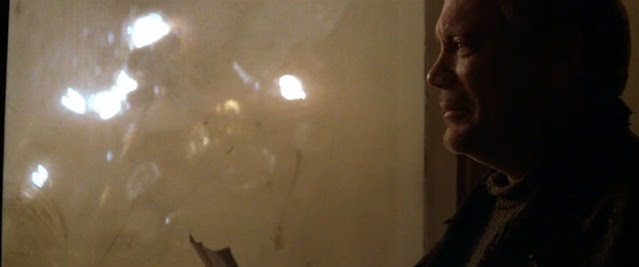 |
| Pineview's crusty sheriff (Daniel von Bargen) gets a letter, in one of the few emotional moments that lands. |
OTHER MUSINGS:
There are three big issues with The Postman. The first is that it is mostly humorless. Mad Max's George Miller would have had great fun embracing the ludicrous elements and leaning into the tropes. In Costner's hands, almost everything is presented with such earnestness that supposedly dramatic moments become unintentionally funny.
There's the big "trailer moment" in which the Postman picks up a letter from a young boy at the side of a road. As the music swells with Great Importance, I find that I can't help but giggle. Another such moment is the overwrought speech Abby gives late in the film, as she tells Costner's Postman: "You give out hope like it was candy in your pocket." And in my head, Leslie Nielsen starts expanding the metaphor by talking about how it's half-melted and tastes funny. And then maybe tries to lure children to a white van with it.
The second problem is that there's no sense of the passage of time. The first Act sees the main character pressed into a post-apocalyptic warlord's army, escaping that army, finding the postal truck, and assuming the Postman's identity. Did this take place over a span of days, weeks, months? We have no idea. What was the interval between his escape and finding the postal truck? Was it weeks later, or did he stumble across the truck that same day? Again, we have no clue.
The main body of the story sees Ford creating a postal service, the Postman eventually agreeing to lead it, and Bethlehem coming to see this fledgling service as a threat that must be eradicated. Surely this takes place over a stretch of several months, if not a year or two? Except that Abby is impregnated by The Postman the night they meet - the very first day that he assumes the Postman's identity - and she only gives birth at the very end of the story. So that means that everything from his arrival in Pineview to the defeat of Bethlehem takes place over approximately nine months!
Never mind that it would actually raise the stakes for the Postman to have a young child to protect while the conflict is ongoing. As I mentioned earlier, this is a movie that never misses an opportunity to squander even the most obvious dramatic potential.
The final, and biggest, problem is the pacing. With a three hour running time, it's little surprise that parts of the story drag. What is a surprise is how much of it feels rushed! We spend entirely too long watching the Postman recuperate in a mountain cabin. Meanwhile, the postal service is created by Ford, entirely offscreen. Oh, and its further growth after the Postman agrees to lead it? That's basically a montage. As is much of the conflict with Bethlehem. And raising an army to face Bethlehem? That's another thing that happens offscreen.
The long running time isn't the problem. The problem is that the movie spends so long on setup that it ends up zooming through what's meant to be the heart of the story. The first two thirds should at most be the first half (probably less), while the final third should be fleshed out to at least a full half.
I'll emphasize again that, at least until the last half hour, I don't actually think this movie is that bad. The first half or so is generally decent. Even in the final hour, there are individual moments that work quite well. The idea of people needing something to believe in, and how that can be used for good (the sense of community created by the postal service) or bad (Bethlehem and the Holnists) is a worthy one, even if the execution is laughably heavy-handed.
And given the competition, I certainly don't think this deserved Worst Picture...
 |
| New carriers are sworn in as the postal service grows. |
THE OTHER NOMINEES:
Anaconda is a deeply stupid monster flick with Jennifer Lopez and Ice Cube leading a documentary crew that makes the mistake of rescuing ultra-crazy Jon Voight, while most of the supporting cast ends up eaten by a giant snake. Unlike The Postman, this movie isn't trying to be anything other than dumb fun, which is precisely why I don't think it belongs on this list.
Batman & Robin would be my personal pick for Worst Picture. It attempts to channel the campy fun of the 1960s series, but it overshoots. Instead of "so bad it's good," it ends up being so bad that it's horrible. Unless you like ice puns or are curious to see how a dominant box office franchise was destroyed by a single film, then the only reason to watch this is for the Rifftrax commentary.
Fire Down Below represented yet another attempt by Steven Seagal to blend mindless action with environmentalism. I never saw it, but since every post-Executive Decision Seagal film that I have seen is dreadful (and not even in a fun way), I have no reason to doubt its awfulness.
Finally, there is Speed 2: Cruise Control. Many thought Keanu Reeves had sabotaged his career by declining to return. Then the movie came out. Even with a scenery chomping Willem Dafoe as the villain, this is too stupid to even qualify as "dumb fun."
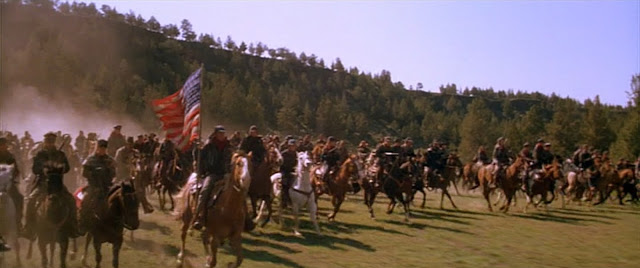 |
| The Postman rides to battle after raising an army offscreen. |
OVERALL:
Kevin Costner's career was never quite the same after The Postman, but it was far from destroyed. His directorial follow-up, Open Range, was made on a smaller budget and smaller scale, and it demonstrated the exact discipline and focus that was absent here; I actually think it's the best of his three directorial efforts.
As an actor, he bounced back with the commercially successful Message in a Bottle... but his leading man days were clearly numbered, and he transitioned to character roles with the well-received Cuban Missile Crisis drama, Thirteen Days. I think the character roles suit his strengths much better than "star" roles, truthfully, and he's kept working consistently in movies and television both good and bad.
As for The Postman? I think it's at least a halfway interesting curio. It's a failure, oddly paced and focusing on many of the wrong parts of its story. But it's rarely less than watchable and often fairly engaging, and I wouldn't rank it as being anywhere near the disaster that contemporary critics made it out to be.
Rating: Raspberry.
Worst Picture - 1996: Striptease
Worst Picture - 1998: An Alan Smithee Film - Burn, Hollywood, Burn!
Review Index
To receive new review updates, follow me:
On BlueSky:
On Threads:


No comments:
Post a Comment